Show celebrates the importance of motherhood
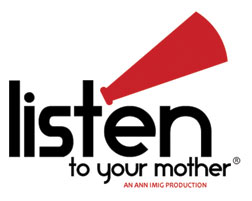 Mother’s Day is Sunday, May 12. Erin Margolin and Laura Seymour would love it if you took your mother, and all your other friends and relatives, to see “Listen to Your Mother,” the night before. The pair are co-producing and co-directing the one night only show 7 p.m. Saturday night, May 11, at Unity Temple on the Plaza.
Mother’s Day is Sunday, May 12. Erin Margolin and Laura Seymour would love it if you took your mother, and all your other friends and relatives, to see “Listen to Your Mother,” the night before. The pair are co-producing and co-directing the one night only show 7 p.m. Saturday night, May 11, at Unity Temple on the Plaza.
“Listen to Your Mother” is a celebration of Mother’s Day with readings by local writers. Ten percent of the ticket proceeds will go to help women being served by the Rose Brooks Center. Tickets are available by visiting the website www.listentoyourmothershow.com/kansascity/.
Margolin explained that “Listen to Your Mother” is a national movement that started in 2010 in Madison, Wisc., with one woman, Ann Imig, and a microphone Just three years later 24 different cities will produce their own unique shows featuring live readings by local women about motherhood.
Margolin, who describes herself as an active blogger and social media participant, “really, really, really wanted to bring it here” to Kansas City from the minute she heard about it.
“It’s not a play,” she said. “It’s something really unique and I thought it would be cool to bring it to Kansas City and produce it. I never really thought in a million years that we would get chosen and we did. I’m really excited.”
Neither she nor Seymour has actually seen a live performance of “Listen to Your Mother.” All the past performances can be viewed online at the listentoyourmother.com main website.
Margolin is thrilled to present this unique show here.
“It’s going viral across the country and it won’t be long before everybody knows what it is. I think if you miss it, you’ll be kicking yourself for not seeing it,” she said.
Margolin said the shows are all different but follow guidelines prepared for by the parent company. Since they got the rights in November 2012 for this year only, Margolin, who has never produced or directed a show before, said things have been hectic. First on the agenda was accepting written submissions from would-be readers.
“We wanted to read the pieces first. Then from there we selected people to audition in front of the two of us, live, so we could make sure they have a good stage presence because they will be presenting this live,” Margolin said.
The final list of readers includes both Margolin and Seymour as well as Rita Arens, Sarah Guthrie, Sarah Manley, Michelle Burdick, Julie Dunlap, Ashley Austrew, Dani Stone, Molly Shalz, Leslie Kohlmeyer, Lisa Allen, Greta Funk and Jenn Mann. The show is expected to last about an hour and 15 minutes.
All the readers in Kansas City are mothers, but that’s not the case in all cities.
“You don’t have to be a mom. You don’t have to be a woman. You just have to be writing about motherhood,” she said, adding that some shows even have a few male participants.
Besides choosing the readers, Margolin and Seymour had to handle all of the logistics, including finding a venue, choosing a photographer and videographer, publicizing the show and selling tickets. A little more than two weeks before the show, Margolin said advanced ticket sales had surpassed 100.
Unity Temple’s sanctuary holds about 700 people, which Margolin admits is a little ambitious for this first “Listen to Your Mother” local production. The venture, she said, “isn’t about making money” as evidenced by the fact they have pledged a portion of the proceeds to charity.
“It’s OK if we have some empty seats,” Margolin said.
“This is about giving Mother’s Day a microphone and being able to give locals the chance to talk about why motherhood is important to them and shine a light on whatever their story is. It’s not for financial gain, it’s just a personal thing. I just really love this whole concept and idea and being able to bring this here,” Margolin said.
The mother of three daughters, Margolin said she used to describe herself as “just a stay-at-home mom.”
“Then so many people got on my case and said it’s not just a mom. You don’t say that. You are a mom and that’s a very important thing,” she said.
This production, she explained, is about showing how important motherhood is.
“It’s not a job that I get paid to do, but it’s very hard work and it’s probably one of the toughest jobs there is. Anyone can be a mom but not everyone can be a good mom. I do lots of things. I’m a teacher. The kids come home with their homework and they need help. I’m their counselor … you have to wear many hats as a mom,” she said.
Margolin is also working on “The Gay Dad Project,” a documentary that is an effort to explore the unique family dynamic that results when one parent in a family comes out.
“I’m a dreamer. There are so many things I want to do. I want to make the documentary. I want to do this show. I’m always looking to get involved in fun, new exciting things. I’m not done yet. There’s more for me to do down the line,” she said.



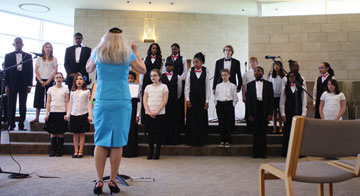
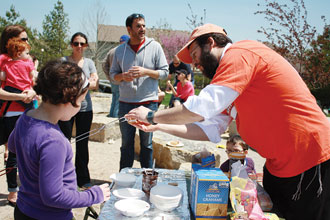
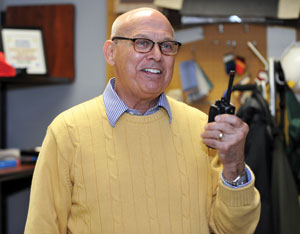 For 25 years, the Jewish Community Campus has been the place where thousands of people gather, learn and play every day. There’s been one individual who’s been at the center of it all since the beginning — Alan Bram.
For 25 years, the Jewish Community Campus has been the place where thousands of people gather, learn and play every day. There’s been one individual who’s been at the center of it all since the beginning — Alan Bram.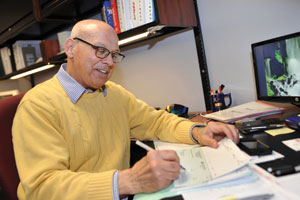 As the executive director, Bram has worked closely with a board of directors. Former board President Irwin Blitt — who co-chaired the Campus Building Committee — was part of the process that brought Bram to Kansas City.
As the executive director, Bram has worked closely with a board of directors. Former board President Irwin Blitt — who co-chaired the Campus Building Committee — was part of the process that brought Bram to Kansas City.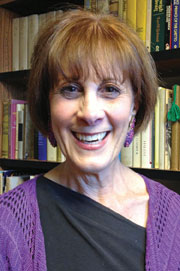 Over the years The Temple, Congregation B’nai Jehudah’s Preschool has established a reputation of being a “very loving, boutique-style preschool.” As the school nears its 45th anniversary, the Reform congregation’s board of trustees recently made a commitment to support the preschool and early childhood programming and hopes to grow its enrollment.
Over the years The Temple, Congregation B’nai Jehudah’s Preschool has established a reputation of being a “very loving, boutique-style preschool.” As the school nears its 45th anniversary, the Reform congregation’s board of trustees recently made a commitment to support the preschool and early childhood programming and hopes to grow its enrollment.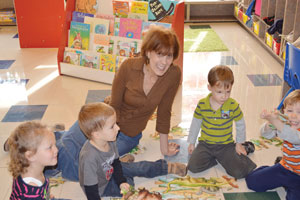 Boxer is already beginning to implement programs that have been successful in her previous position. She believes parent education is a very important component of a successful preschool.
Boxer is already beginning to implement programs that have been successful in her previous position. She believes parent education is a very important component of a successful preschool. What is Jewish leadership? How does a community inspire its members to become strong leaders? These are questions that Erica Brown, Ph.D. has been helping communities deal with for years. The Jewish Federation of Greater Kansas City is bringing her to the area May 8-9 to help guide the community in the area of leadership.
What is Jewish leadership? How does a community inspire its members to become strong leaders? These are questions that Erica Brown, Ph.D. has been helping communities deal with for years. The Jewish Federation of Greater Kansas City is bringing her to the area May 8-9 to help guide the community in the area of leadership. It hardly seems like 20 years for Lauren Aaronson, when she looks back at the project she helped spearhead at Congregation Beth Torah. But two decades of Sundays have gone by as congregation members have provided Sunday dinners for the residents of SAVE Home.
It hardly seems like 20 years for Lauren Aaronson, when she looks back at the project she helped spearhead at Congregation Beth Torah. But two decades of Sundays have gone by as congregation members have provided Sunday dinners for the residents of SAVE Home.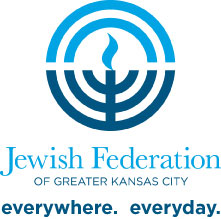 “In response to the requests we have had to help the victims of the Boston bombing, we are working in sync with Combined Jewish Philanthropies (CJP), Greater Boston’s Jewish Federation, to provide people with a Jewish response to helping victims and their families recover from this traumatic event,” said Gail Weinberg, director of financial resource development for the Jewish Federation of Greater Kansas City.
“In response to the requests we have had to help the victims of the Boston bombing, we are working in sync with Combined Jewish Philanthropies (CJP), Greater Boston’s Jewish Federation, to provide people with a Jewish response to helping victims and their families recover from this traumatic event,” said Gail Weinberg, director of financial resource development for the Jewish Federation of Greater Kansas City.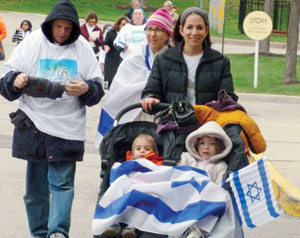
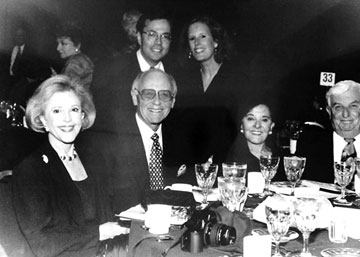 It was April 1974. Waiters scurried about the ballroom of the Muehlebach Hotel in downtown Kansas City, Mo., and organizers stressed over final details. The Hyman Brand Hebrew Academy was founded just eight years before, and this, the night of the first Civic Service Awards Dinner, was to be the school’s boom or bust fundraising event. The fledgling Jewish day school was attempting something fairly revolutionary — organizing a dinner that would attract hundreds of prospective HBHA supporters. As Richard Berkley, then the mayor of Kansas City, Mo., took the stage and accepted his honor, more than 500 guests stood up and applauded. At that moment, the extraordinary tradition that is the Civic Service Award Dinner had begun.
It was April 1974. Waiters scurried about the ballroom of the Muehlebach Hotel in downtown Kansas City, Mo., and organizers stressed over final details. The Hyman Brand Hebrew Academy was founded just eight years before, and this, the night of the first Civic Service Awards Dinner, was to be the school’s boom or bust fundraising event. The fledgling Jewish day school was attempting something fairly revolutionary — organizing a dinner that would attract hundreds of prospective HBHA supporters. As Richard Berkley, then the mayor of Kansas City, Mo., took the stage and accepted his honor, more than 500 guests stood up and applauded. At that moment, the extraordinary tradition that is the Civic Service Award Dinner had begun.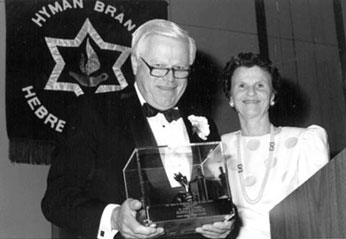 The honorees recognized over the 40 years of the dinner feature community leaders from all backgrounds, including politics, business, sports and the Jewish community. Politicians who have been honored include congressman and former Kansas City, Mo., Mayor Emanuel Cleaver, along with his wife Dianne, as well as Kansas City’s current Mayor Sly James, who was honored just last year. From the business world, leaders such as Henry W. Bloch of H&R Block, honored in 1980, and Donald J. Hall of Hallmark Cards, honored in 1976, boosted the prestige of the dinner. The former owner of the Kansas City Chiefs and Kansas City Wizards franchises, Lamar Hunt, was honored in 1997, and Kansas City Royals Hall of Fame third-baseman George Brett was honored in 2000.
The honorees recognized over the 40 years of the dinner feature community leaders from all backgrounds, including politics, business, sports and the Jewish community. Politicians who have been honored include congressman and former Kansas City, Mo., Mayor Emanuel Cleaver, along with his wife Dianne, as well as Kansas City’s current Mayor Sly James, who was honored just last year. From the business world, leaders such as Henry W. Bloch of H&R Block, honored in 1980, and Donald J. Hall of Hallmark Cards, honored in 1976, boosted the prestige of the dinner. The former owner of the Kansas City Chiefs and Kansas City Wizards franchises, Lamar Hunt, was honored in 1997, and Kansas City Royals Hall of Fame third-baseman George Brett was honored in 2000.